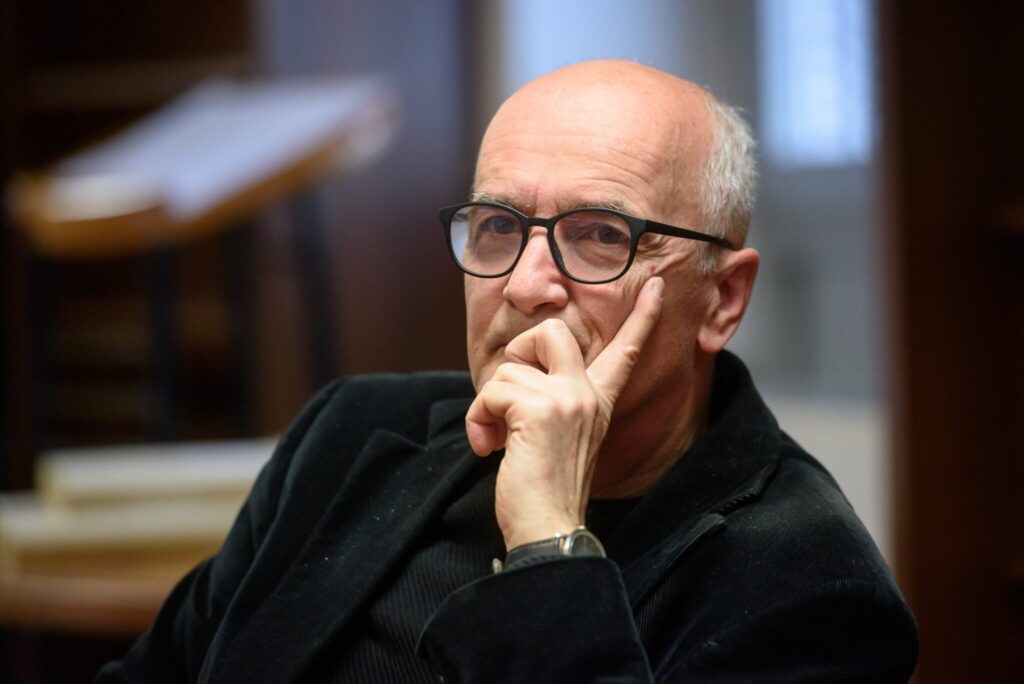In recent years in Slovenia, we have witnessed the ease with which some people call others “fascists.” Professor Stanković from the Faculty of Social Sciences recently called Slovenian folk music “fascistoid” on the radio programme Val 202. In his column in the Mladina magazine, another professor from the same faculty, Vlado Miheljak, came to Stanković’s aid. Such labelling of the symbols associated with the nation and homeland is certainly not accidental, much less justified. In the background of such actions is usually a fight to preserve the old social climate, and consequently, privileges and positions. And what is even more frightening is that it announces an uncompromising fight against the democratic forces. Professor Borut Rončević said the following about Miheljak: “In his column, Miheljak listed by name some of the people that will have to be faced uncompromisingly… The radical leftists are becoming more and more obsessed.”
President Borut Pahor recently pointed out the lightness of the abuse of the word “fascism”: “This calling of names, which has somehow become part of our everyday lives, especially when it comes to the term fascism and the things that were a terrible part of our history, and which our grandparents and great-grandparents still have terrible memories of… This is what we seem to be using in discussions and debates, without truly realising what it is that we are actually saying.” It seems that this criticism strongly applies to the professor from the Faculty of Social Sciences, Dr Peter Stanković, who said the following in a show on the radio station Val 202: “There is nothing wrong with traditional societies. However, traditional values in a modern context can be problematic for a variety of reasons. People who listen to this kind of music (folk music) live in this world and think in a very uniform way: one value, one nation – at some point, they will only need a single leader, and we will end up where we do not want to be.
We can see that politics with more autocratic tendencies appropriate, support, use and exploit this music – and not only in Slovenia. I do not want to say that this music is autocratic, fascistoid in itself, but with its simple, unambiguous, uniform world, it is a very easy target for such appropriations.” In his column in the ultra-leftist weekly Mladina, his academic colleague Vlado Miheljak defended Stanković. In his article, he could not help himself but also mention burek, the cultural borders of the Balkan, his own burden related with the character and work of the current Prime Minister Janez Janša (or his honorary doctorate from Priština), and other similar things. However, Miheljak’s confrontation with the newspaper Slovenske novice and the journalist Igor Pirković, who tried to fight this slander of folk music, is worth a little more attention.
Both of the aforementioned professors from the Faculty of Social Sciences certainly did not experience the horrors of fascism themselves (otherwise, they would likely not find it as easy to use such words so carelessly). Miheljak, for example, has also used the expressions “Mussolinisation” and even a newly invented “de-Janšaisation” (given the real situation in the social subsystems, the term “de-Kučanisation” would be much more appropriate, if we really want to stoop to that level…). The gentlemen from the Faculty of Arts did not have to actually experience the national oppression, famine, camps, torture, and war. And that is why their vehement use of this kind of “vocabulary” seems surprising. However, we could hear similar vocabulary from the last leader of the Communist Party in Slovenia, Milan Kučan, who in 1988 compared the workers who fought for independence and democracy fascists. In 2022, he continued his observations in Dražgoše, and the whole thing is starting to border on political schizophrenia.
The weekly Mladina is a parasite that is financed by patients
The communist Romanian dictator Nicolae Ceaușescu acted in a similar manner – however, it ended badly for him. He was tried by the people, who put him before a wall, and he was shot. When someone without even a hint of respect for the victims of fascism uses these vile words, we can know that this is about something else entirely. Usually, there is a fear of losing various bonuses and social positions acquired through the party (or blood) line involved. This is about maintaining the social climate that underestimates ambition and real success. This is a desire to be a parasite at the expense of the taxpayers. And Mladina, the weekly for which Miheljak writes, is a part of the transitional parasitic system. It is powered by mafia deals in healthcare and financed through the purchasing of too-expensive vascular stents and other similar deals.
With this, we are also reminded of the controversial companies in our neighbouring countries and the Parallel Mechanism, about which economist Rado Pezdir wrote in his book. The parallel mechanism is a combination of the work of academic circles, civil society (specifically many of the non-governmental organisations on Metelkova 6), the judiciary, the prosecutor’s office, the media, and so on. However, we must keep in mind the fact that ambition and honest work are not enough for the successful development of society, but we also need belonging to the social environment, province, country and nation. The positive attitude of individuals towards these entities increases the amount of care they express for them. And the greater the concern, the greater the personal input. Even private property is valued differently than public property. And if folk music awakens in people positive feelings of belonging that strengthen their connection with the local community, their awareness and the level of care, then it is more than welcome – or even necessary.
Domen Mezeg


